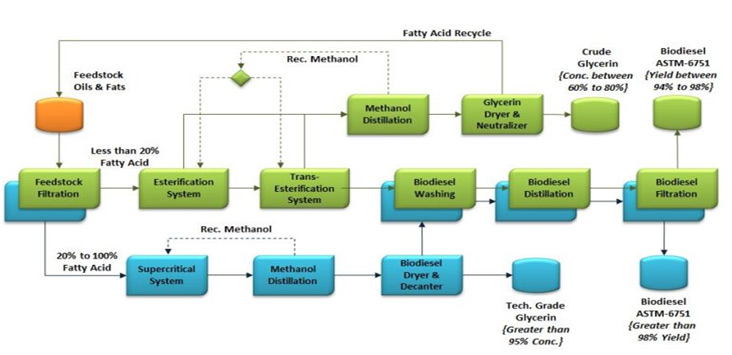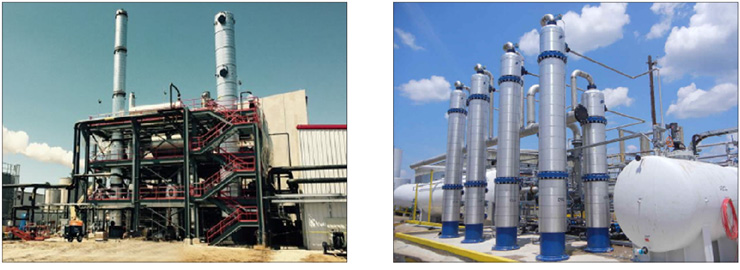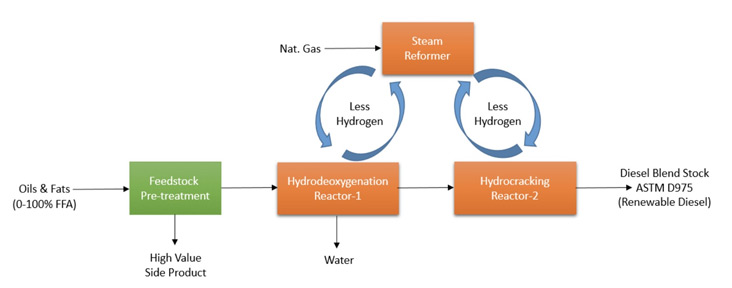Super Critical Biodiesel Technology
Fenix has an exclusive technology collaboration with RPS, USA
RPS offers Biodiesel production technology both in traditional and supercritical pathways. Each pathway addresses diverse feedstock parameters with high production efficiency. We have extensive experience building turnkey facilities and provide engineering services. Till date we have built more than 19 facilities ranging from 3 to 50 million gallons per year in the last decade. Our production process has been refined through years of R&D, along with build experience.


Our range of processes include:
Feedstock Filtration
Oils & Fats go through a degumming process to remove moisture, insoluble, unsaponifiables, gums, phospholipids, metals and protein. It is a continuous filtration process that involves drying and clay filtration. This step is very critical for continuous and efficient operation of the Biodiesel production facility. The feedstock filtration step for supercritical pathway have some added features compared to a traditional pathway. These added features maintain certain key feedstock parameters below the limit for uninterrupted operations of the supercritical system.
Esterification System
Esterification is a well known traditional method to reduce Fatty Acids in oils & fats. Through Esterification, the fatty acid is converted to methyl esters. The reactions in the Esterification method are stalled due to water formation. RPS innovative continuously Esterification method is capable of handling Fatty Acids up to 20% and reduce it to less than 1.5% in a single pass. This method was invented by RPS to drive the Esterification reaction forward by continously addressing the water formation. The oils & fats post Esterification system are less in fatty acid. Such that, it can be handled by any traditional Trans-Esterification System.
Supercritical System
Supercritical method to produce Biodiesel is offered by RPS after years of R&D, pilot scale operations and building two production facilities. This method is patented and is a unique process to eliminate catalyst use altogether. The saving incured due to elimination of catalyst is more than enough to justify the excess energy usage through the Supercritical method.
Supercritical reaction does both Esterification and Trans-Esterification reactions in one step under high pressure and temperature using excess solvent. The advantage is a product (methyl ester) with no impurity such as soaps and produce high qality glycerin above tech. grade. The supercritical system is a system with small footprint and far less equipment compared to traditional methods. The supercritical production methodology to produce methyl ester is the next generation technology that offers several pathways to produce high value byproducts from pure methyl esters.
Methanol Distillation
RPS offers Methanol Distillation units for both Traditional and Supercritical production pathways. It is very critical to recover and produce high purity solvent to be able to reuse back into the production facility. We are the leader in the industry for solvent distillation units. Our units are capable of producing less than 500 ppm moisture solvents with the lowest reflux ratios and energy usage. Our distillation units are made of high quality workmanship that are comparable to none other. RPS produces its own distillation trays, packing material and column internals. It maintains high quality manufacturing standards at every stage of manufacturing process. We invite interested clients to visit our facility, to know more about our manufacturing capabilities.
Glycerin Dryer & Neutralizer
In a Traditional method, the accumulated crude glycerin contains high amount of solvent, soaps and other impurities. RPS offer a falling film or forced circulation evaporators to handle crude glycerin to avoid product degradation and produce high concentration glycerin. The crude glycerin is neutralized to recover fatty acids and recycle back into the production facility. All the above process is done continuously and energy is recovered through economizers to be energy efficient.
Biodiesel Dryer & Decanter
In the Supercritical method, post Methanol Distillation the methyl ester (Biodiesel) contains trace quantities of methanol, moisture and glycerin. RPS provides a forced circulation evaporator for the Biodiesel drying step to remove moisture and trace methanol before decanting the glycerin. The decanted glycerin is of high purity (above 95% pure) without any soaps, what so ever. All the above process is done continuously and energy is recovered through economizers to be energy efficient.
Biodiesel Washing
RPS offers Biodiesel Washing units for both Traditional and Supercritical production pathways. Washing the Biodiesel is necessary to remove trace quantities of free glycerin present in the methyl ester (Biodiesel) to meet the ASTM-6751 specification. RPS offers two methods to handle the washing step, one is through the centrifuge step and the other is through liquid-liquid counter current column. Both are efficient systems that have their own unique advantages and disadvantages. Both units bring down the free glycerin content in the methyl ester to less than 200 ppm. RPS manufactures its own liquid-liquid columns and is partnered with GEA Westfalia for its centrifuge needs. RPS considers GEA Westfalia systems are well suited for methyl ester applications due to its design and capabilities. RPS packages the centrifuges with dosing system, drop vessels and associated automation to be cost effective and to provide a robust solution.
Biodiesel Distillation
RPS offers Biodiesel Distillation units for both Traditional and Supercritical production pathways. Biodiesel Distillation is necessary in today's industry to eliminate any trace impurity to meet and exceed ASTM-6751 specification and to produce distilled product (color less) that is attractive to the customer. Our Biodiesel Distillation Columns are capable of fractionating the distilled Biodiesel if needed to meet various customer cloud point specific needs. RPS manufactures its own column, internals, trays and packing. Our columns are highly energy efficient and our equipment is far superior to any other competitor in the market. The accumulated bottoms in a traditional method is sent to the storage for sale, whereas the bottoms accumulated in the supercritical method is recycled back into the production facility with trace quantity being stored for sale as feedstock with high color.
Biodiesel Filtration
RPS offers Biodiesel Filtration Systems for both Traditional and Supercritical production pathways. The Biodiesel Filtration system is similar to the Feedstock Degumming system with different filter aid been used. RPS provides these systems to address any stringent specification requirements by the customer, process upsets and to blend finished products to a specific customer needs. We work with the clients to address their product specification and meet their requirement at this stage.
Renewable Diesel
RPS has been working on Renewable Diesel production process for the past few years. We have developed a unique production process that pre-treats the feedstocks such as vegetable oils, animal fats and used cooking oils to a specific standard prior to converting them to Renewable Diesel. This unique method of feedstock standardization comes with many advantages.
- The highest yield of Renewable Diesel from Feedstock.
- Less Hydrogen consumption in Hydrogenation step.
- A trace quantity of side products.
- Maintains the maximum Catalyst life.
- Less equipment to process side streams and VOC’s.
- Less Capital Cost and Processing Cost.
RPS Renewable Diesel Process:

RPS in collaboration with few other firms is building its first commercial-scale facility using the above technology. The facility will be capable of processing 150 TPD (tons/day) of vegetable oils, animal fats and used cooking oils. The plant is expected to be operational by end of 2019.
